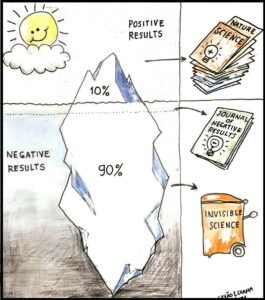Luis Fernando Sayão, Professor, researcher da Comissão Nacional de Energia Nuclear, Centro de Informações Nucleares, Rio de Janeiro, RJ, Brazil.
Luana Farias Sales, Professor, researcher do Instituto Brasileiro de Informação em Ciência e Tecnologia, Programa de Pós-Graduação em Ciência da Informação, Rio de Janeiro, RJ, Brazil.
Carla Beatriz Marques Felipe, Professor at the Department of Librarianship and Information Unit Management, Universidade Federal do Rio de Janeiro, Rio de Janeiro, RJ, Brazil.
Scientific discoveries are like an iceberg that floats in the ocean of knowledge exhibiting only about 10% of published findings, supported by 90% of unpublished negative results. This metaphor echoed by the Negative Results Scientific Journal gives us the dimension of the extraordinary loss of information, which makes a large part of scientific activity invisible. In fact, negative results from thousands of experiments, many of them of great importance for the progress of science, will never see the light of day and will remain forever locked in the notebooks of laboratories, drawers and personal computers of their researchers where they will inevitably be swallowed up. by time and technological obsolescence. Even with the assumption that the scientific method is absolute and that the experiments were well designed and controlled, their results, however, may never be reported. This agenda is discussed in the article “Invisible science: publication of negative research results”, published in the journal Transinformação (vol. 33).
However, in the routine of laboratories, negative results — non-confirmatory and null results, inconclusive experiments, unexpected data, etc. — permeate the entire research cycle, and constitute an important part of the integrality of scientific communication flows. It is the negative findings that result in the rejection of hypotheses that compel scientists to reflect critically on the validity of current thinking, that reveal new views, and that, finally, revolutionize science. The confrontation and refutation of ideas is the continuous motive for the generation of scientific knowledge. Philosophers who developed their reflections on scientific progress, such as Karl Popper, Thomas Kuhn and Bruno Latour, are emphatic in affirming the importance of the transition from current paradigms — however long-lasting they are — and new conceptions. The aim of science is not to produce indisputable truths, but to standardized public discussions.
The scientific context induced by the bias of positive results has a clear impact on scientific communication flows. There are few academic publishing media that accept negative results, despite the tens of thousands of academic journals in circulation. Academic journals only accept negative results in some cases on the grounds of the low impact of these reports. However, negative results, far from being of little value to science, are now an integral part of scientific progress. This fact signals the need to incorporate these results into academic publication and reward schemes, redefining a more diversified ecology of scientific findings and less distorted by the positive bias, which presents, in a transparent manner, all sides of a scientific discovery.
The most evident result of not publishing and sharing negative results is the waste of resources, time and intellectual effort. This means not communicating to other researchers “dead ends” that can be avoided or circumvented by alternative strategies. It can also be conjectured that the consolidated means of publishing negative results avoid ethical problems, both caused by the so-called “publication bias”, which create an artificial inclination towards more easily publishable results, as well as the unnecessary sacrifice of animals by the repetition of experiments – a contemporary critical issue for science. The opacity of negative results hides important, innovative and disruptive experiences, which contribute to the critical challenge of refuting prevalent paradigms and current assumptions. When the intricacies of a scientific finding and its path of errors and successes are neglected, there is a weakness in the principles of reproducibility of scientific experiments, in the power of self-correction of science and in the assumptions of open science; a large gap is also created in the academic memory of research institutions.
In addition to laboratories, the benefits revealed by scientific and technological advances are received by society more quickly and in a more secure and transparent manner. For managers, research financiers and other stakeholders responsible for scientific governance, the publication of negative results justifies the time invested in the research and provides a more accurate dimensioning of the necessary resources. For publishers, the publication of negative results presents itself as a new element in their business model, becoming one more important channel of scientific communication.
Although it is noticeable the growing awareness of the importance of negative results on the part of the scientific community and some editors who have been triggering actions that seek to reverse the pessimism that involves the publication of these results, the study finds the initial assumption that there are still few scientific journals who accept, edit special numbers or are dedicated to publishing negative results. Furthermore, this list of journals has relatively low impact factors – when identified – and the titles focus on specific areas, such as Biomedicine, indicating that the publication of negative results is not yet universally practiced. accepted in science.
References
ALMEIDA, F. G. and CENDÓN, B. V. O viés de publicação: por que publicar resultados negativos? Perspect. ciênc. inf. [online]. 2020, vol. 25, no. 2, pp. 223-243. ISSN: 1981-5344 [viewed 12 February 2021]. https://doi.org/10.1590/1981-5344/3992. Available from: http://ref.scielo.org/qnbhwt
SAYÃO, L. F. and SALES, L. F. Dados abertos de pesquisa: ampliando o conceito de acesso livre. Revista Eletrônica de Comunicação, Informação e Inovação em Saúde [online]. 2014, vol. 8, no. 2, pp. 76-92. e-ISSN: 1981-6278 [viewed 12 February 2021]. https://doi.org/10.3395/reciis.v8i2.611. Available from: https://www.reciis.icict.fiocruz.br/index.php/reciis/article/view/611
SALES, L. F. and SAYÃO, L. F. A ciência invisível: revelando os dados da cauda longa da pesquisa. IN: ENCONTRO NACIONAL DE PESQUISA EM CIÊNCIA DA INFORMAÇÃO, 19, 2018. Available from: https://brapci.inf.br/index.php/res/v/103678
SAYÃO, L. F. et al. A ciência invisível: por que os pesquisadores não publicam seus resultados negativos? Informação & Informação [online]. 2020, vol. 25, no. 4, pp. 98-116. e-ISSN: 1981-8920 [viewed 12 February 2021]. https://doi.org/10.5433/1981-8920. Available from: http://www.uel.br/revistas/uel/index.php/informacao/article/view/40016
To read the article, acess
SAYAO, L. F.; SALES, L. F. and FELIPE, C. B. M. Invisible science: publication of negative research results. Transinformação [online]. 2021, vol. 33, e200009. ISSN: 2318-088 [viewed 12 February 2021]. https://doi.org/10.1590/2318-0889202133e200009. Available from: http://ref.scielo.org/5v6hht
External links
Transinformação – TINF: www.scielo.br/tinf
Como citar este post [ISO 690/2010]:



















Recent Comments